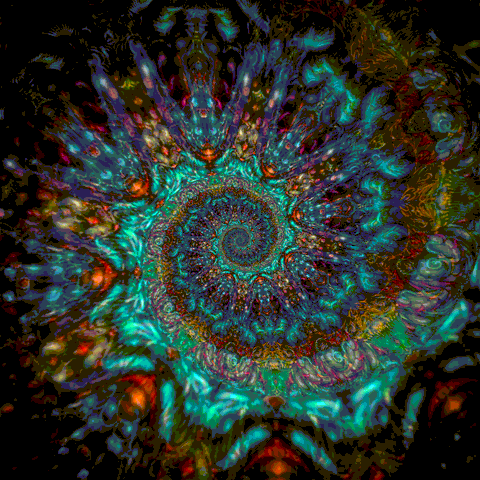


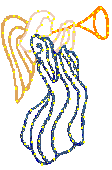
Welcome to the
Tower of Song
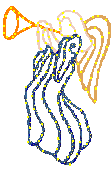
The program is hosted by the Gypsy Scholar & Bohemian Essayist. It airs weekly on KSQD 90.7 FM from 12 - 3 a. m. on Mondays, and streams live on ksqd.org.
The Gypsy Scholar has designed this Tower of Song website as a kind of cyberspace Imaginarium and Illuminated Manuscript.
And since the Gypsy Scholar designed this website to be an integral part of the radio program—synergistic with it—, he would suggest that this website, with its animated images, could be described as (to borrow a technical, audio-visual term from early animated features on the silver screen and TV) "Illustrated Radio," in the sense of the concept behind the program—"Re-Vision Radio."

The Gypsy Scholar says:
"See what I mean"
by the imaginal Tower of Song
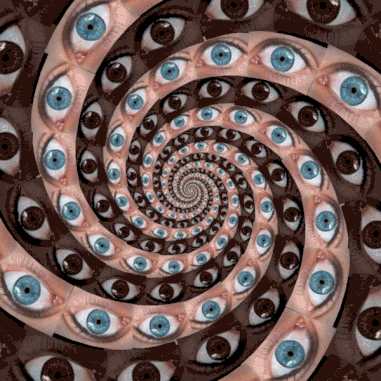
To help see what the GS means by the grand metaphor of the "The Tower of Song" the memes below are provided, because the purpose of his music program is to transport listeners into the Tower of Song (that "ancient tower"), wherein one feels like they're not just listening to a great song but rather they themselves have become a "great song"! (For various takes on the meaning of the "Tower of Song" as metaphor or symbol, see the "The Metaphorical Key to the Tower of Song" page.)

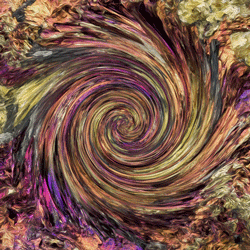
.jpg)



.
If you can't sleep and are searching "in the middle of the night" for another reality, the (Romantic) TOWER OF SONG is one of those in-between places that cultural anthropologists call "liminal," or "threshold," zones—in between sleeping and waking, night and day, inside and outside—that are located at the crossroads of dreaming and waking consciousness, where the laws of time, space and causality are attenuated and you experience synchronicity. At the midnight witching hour, the TOWER OF SONG is that imaginal place other than the one of the normal daytime routine—"a somewhere else, where we also long to belong and need to go to from time to time." Thus everybody knows that "we are reminded of this place by a song we hear on the radio." The Gypsy Scholar would have his listeners, "in the middle of the night," transported to this "somewhere else" place through the gateway of song into the "Invisible Landscape" he calls the TOWER OF SONG
.
The purpose of Re-Vision Radio's (Romantic) TOWER OF SONG program is to guide its listeners—“in the middle of the night”—in searching for, by breaking out of everyday reality ("pierce the realm of glamor"), and following the song (the "songlines" of the planet), to find and enter into that long-abandoned Romantic “Lonely Tower,” situated "on the banks of the river of dreams" in that alternative mental dimension—the “Invisible Landscape.”
.


I’m a dweller on the threshold
And I’m waiting at the door
And I’m standing in the darkness
I don’t want to wait no more
I have seen without perceiving
I have been another man
Let me pierce the realm of glamor
So I know just what I am.
I’m a dweller on the threshold ...
(Van Morrison, 'Dweller on the Threshold')
.
To the Gypsy Scholar, "The Life of the Mind" means the Creative Imagination and the Inner/Interior Life.
The TOWER OF SONG is a Philosophical & Musical program—trafficking between the night and the dawn, and exploring the interface between philosophy and popular culture—underwritten by the TOWER OF SONG's presiding spirits: Hermes-Mercury, Orpheus, and the Angel of Imagination, and hosted by the Gypsy Scholar & Bohemian Essayist, who presents "Mental Studies & Performances" (William Blake) in the shape of the Orphic Essay-with-Soundtrack.
As a Philosophical program, it's about the Ideas in music. As a Musical program, it's about the Music in ideas. Thus the (Romantic) TOWER OF SONG program is finally about a Musekal Philosophy—"Philosophy in a New Key" (as one philosopher has termed it).
The ideas broadcast from the TOWER OF SONG are not just the usual abstract kind of ideas; they are poetical ideas (not abstract, but "poetic thinking") expressed with the aid of music. This kind of music has been identified as "Music that can deepest reach." (R.W. Emerson) In other words, the Gypsy Scholar's program is aesthetically oriented.
"The truth of things can only be expressed aesthetically—in story, pictures, film, dance, and music. Only when ideas are poetic do they reach the depths and express the reality."–Thomas Moore
And, when channeled through the Orphic Essay-with-Soundtrack, they are also musical ideas—ideas which issue not in a discursive but a lyrical knowledge. Therefore, in the TOWER OF SONG, the "Life of the Mind" is actually the life of the imaginal mind, or what the Romantics called "Imagination." This means that the imaginal mind makes the TOWER OF SONG's music that has soul ("soul music") a "Soul-making" (Keats) program.
The aim of the TOWER OF SONG is to defy traditional categories, confound stylistic classification, and make a hash out of hard-and-fast genre conventions (as in conventional radio formats of either "music"or "news and information"), especially the conventional boundaries between high (academic) culture and low (pop) culture. Thus, the Gypsy Scholar practices an orphic scholarship, or "scholarship as performance art" ("Mental Studies & Performances") through the Orphic Essay-with-Soundtrack, which mixes and remixes high academic culture and low pop-culture—"high argument" (Wordsworth) and "deep song" (Lorca). As the Gypsy Scholar puts it, the program is not from the "Ivory Tower," but from "that tower down the track." Or, as that Orphic Scholar himself put it a century and a half ago:
"I embrace the common, I explore and sit at the feet of the familiar, the low." (R. W. Emerson)
Therefore, the Gypsy Scholar's musical program would emulate Jorge Luis Borges"magical realism:"
“A history of a man's dreams is not inconceivable; . . . or of all the moments when he imagined the pyramids; or of his traffic with night and with dawn.”
The "history of a man's dreams is not inconceivable," because the Gypsy Scholar—in "his traffic with night and with dawn"—has dreamed (in the mode of William Blake's "Poetical Genius") the TOWER OF SONG. And he now hopes that there are those listeners who can
"see what I mean"!
.
.jpg)

.
As a program dedicated to the "Life of the Mind," the Tower of Song deals in Ideas—the ideas in music and the music in ideas.
"The office of the [Orphic] scholar is to cheer, to raise and to guide men by showing them facts amid appearances. He plies the slow, unhonored, and unpaid task of observation." –Emerson
The Gypsy Scholar—broadcasting in exile (from the "Ivory Tower")—has taken Emerson's advice, and is working for the ("another office") degree of the "Orphic Scholar." It's not so much that the academic scholar becomes a "popularizer," but more that he becomes the public (outsider) intellectual: ". . . the public role of the intellectual as outsider, 'amateur,' and disturber of the status quo." (Edward Said) Therefore, the "Gypsy Scholar" radio handle stands for the outsider intellectual and the affirmation of "unpaid," or "amateur" (for the love of it), status of scholarship. However, in today's university this is a down-and-out status:
"Sometimes—most time—I think that the way down and out leads out of the university, out of the academy. But perhaps it is rather that we should recover the Academy of earlier days—the Academy of Plato in Athens, the Academy of Ficino in Florence. . . . At any rate, the point is first of all to find again the mysteries." –N. O. Brown (Phi Beta Kappa Graduation Address, Columbia University, 1968.) [For Platonic Academy, see "School of the Night"page.]
"To find again the mysteries"—this is the task of the "Orphic Scholar." Yet, given the reality of the university today, this goal must be sought outside the academy. More plainly and accurately stated, scholarship moving down and out (to that "tower down the track") means that the Gypsy Scholar's field of study is the phenomenon of "the vulgar," "the profane," "the common"—popular culture (as expressed in today's popular song, especially "sixties" and post-sixties music; that historical "triumph of vulgarity"). Thus, Ralph Waldo Emerson's advice to the young scholar: “I embrace the common, I explore and sit at the feet of the familiar, the low.” In this neo-Troubadourean /Dantean move down to the "vulgar," the Gypsy Scholar (as a "troubadour of knowledge") doesn't leave high culture (traditional philosophy, poetry, literature, arts and letters) behind, but instead subordinates it to a blend/mix of the high and the low. As stated in his "Re-Vision Radio Manifesto & Visionary Recital": ". . . high academic culture and low pop-culture—high argument & deep song—; not from the Ivory Tower, but from 'that tower down the track,' the TOWER OF SONG...." [See "Re-Vision Radio" page.] Therefore, the Gypsy Scholar, broadcasting in exile from the Ivory Tower, seeks "another office"—the higher office of the Orphic Scholar:
"Ah ye old ghosts! ye builders of dungeons in the air! why do I ever allow you to encroach on me a moment; a moment to win me to your hapless company? In every week there is some hour when I read my commission in every cipher of nature, and I know that I was made for another office, a professor of the Joyous Science, a detector & delineator of occult harmonies & unpublished beauties, a herald of civility, nobility, learning, & wisdom; an affirmer of the One Law, yet as one who should affirm it in music or dancing, a priest of the Soul yet one who would better love to celebrate it through the beauty of health & [the] harmonious power [of music].” [See Emerson section on "Musekal Philosophy" page.]
Orphic Scholarship, then, ever mindful of Wordsworth's Romantic complaint—"murders to dissect"—, re-visions a scholarship that synthesizes and celebrates; a scholarship not in service to thanatos, but in service to eros—“Reason in its most exalted mood.” Scholarship under eros is a Romantic re-enchantment, and this re-visioning of scholarship of the Ivory Tower can be called "re-enchantment of the academy." Therefore, the Orphic Scholar in our new age logically becomes the Radio-scholar (the public intellectual on radio) of the "Joyous Science," which is the practice of "scholarship as performance art:" a mode of scholarship as artistic endeavor, wherein the modern-day "Orphic Scholar" is distinguished by the ability to synthesize and "play with knowledge"—to create “a collage of ideas” in a musical context. For the scholar-artist, or "Orphic Scholar," on radio the literary text becomes "radio-text." [For the complete lowdown on the GS's mixing of philosophy and song through the "Orphic Essay-with-Soundtrack," see "Musekal Philosophy" page.] To cite the "Re-Vision Radio Manifesto & Visionary Recital' once more in rethinking or re-visioning radio:
"RE-VISION RADIO is a Philosophical and Musical program broadcast from an imaginal window at ----- on your radio dial from the TOWER OF SONG. It’s hosted by the Gypsy Scholar and Bohemian Essayist, with a flower in one hand (or name) and a sword in the other. RE-VISION RADIO is a “Soul-making” program, because it’s essentially an “underworld perspective”—a seeing below surface appearances to the occult or symbolic truth of things. Thus, Everybody Knows, RE-VISION RADIO is truly Underground Radio.... RE-VISION RADIO’s musical inter-textuality, because it reads metaphorically between the lines of Philosophy & Song, becomes the imaginal hyper-textuality of a Soul-text." [For full "Manifesto," see "Re-Vision Radio" page.]
The Gypsy Scholar takes his cue from the Romantics, who believed that "the business of philosophy was no longer just to analyze and argue but to expand and alter our vision." This Romantic project is the Philosophical Quest-Romance that the "literary" Gypsy Scholar holds out to both his listeners and his readers—to search for and enter the imaginal TOWER OF SONG (a three-dimensionality of architectural "frozen music" that allows the reader /listener to walk in). [See "Philosophy Quest-Romance" page.]
The purpose of Re-Vision Radio and its cyberspace website is to help guide its listeners to find and enter into that "invisible landscape" in order to discover the magic door (le porte magique) that opens into the TOWER OF SONG,"where the poetic champions compose", and where all mystic hallways (synesthetically lined with intricate tapestries of spoken-word and song) lead to Soul-making connexions—an imaginal realm where all meanings, through the synergy of magical radio effects (ideas+music+images), are finally and wonderfully visible—that allow you see what they mean! And, if the Orphic deep-song is really "heard"—by entering into its unfolding—, then radio listeners might completely enter the TOWER OF SONG and see what it means.
“Works of literature also move in time like music and spread out in images like painting. The word narrative or mythos conveys the sense of movement caught by the ear, and the word meaning or dianoia conveys, or at least preserves, the sense of simultaneity caught by the eye. We listen to the poem as it moves from beginning to end, but as soon as the whole of it is in our minds at once we ‘see’ what it means. More exactly, this response is not simply to the whole of it, but to a whole in it: we have a vision of meaning or dianoia whenever any simultaneous apprehension is possible.” —Northrop Frye
Re-Vision Radio's Orphic Essay-with-Soundtrack creates a new sonic form, a radio-text where Argument & Song (dialectics and music, logos and mythos, analysis and synthesis) interface. And because there's a song hermetically hidden in an essay and, conversely, an essay waiting to be revealed in a song, this means Re-Vision Radio’s essays contextualize its songs, and, conversely, its songs compose the essay. Thus, the fusion of song and argument is the rhyme and reason for the Orphic Essay-with-Soundtrack, and function (in the way the history of Rock 'n' Roll describes) as “lyrics that make one think”.
Re-Vision Radio's Orphic Essay-with-Soundtrack, mixing Argument & Song in a way that's both intellectually stimulating and emotionally satisfying, is designed to facilitate philosophical enchantment (“to make magical again”), wherein a central idea or theme is musically expressed in order to create an overall mood, and thus guiding its listeners into the Tower of Song. And because Re-Vision Radio participates in the great Romantic project of the "re-enchantment of the world,” the Gypsy Scholar would invite listeners to enter the center of enchantment by following, "in the middle of the night,” the song into the Tower of Song. Therefore, before the dawn breaks and the Orphic magic ends (as in Shakespeare's A Midsummer Night's Dream), the Gypsy Scholar wants to know this from his listeners:
.
I wanna know did you get the feelin'?
Did you get it down in your soul?
I wanna know did you get the feelin'?
And did the feelin' grow and grow
Did ye get healed?
(Van Morrison, “Did Ye Get Healed?”)
.
.
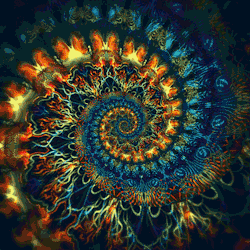
The Angel of Imagination & Music to the Gypsy Scholar on the night he found the Tower of Song:
“Let your flame burn into the night, I saw you knockin’ with your heart.”
After many years since the Re-Vision Radio program was last on the air—"too long in exile / too long not singing my song / too long in exile"—, this website at last allows its listeners to virtually "see what I mean" by the (Romantic) Tower of Song. Thus, Re-Vision Radio's audio-visual modality offers its audience an experience of synesthesia.
Its Orphic Essay-with-Soundtrack seamlessly mixing Philosophy & Song (dialectics/argument and music, logos and mythos), would, through Orpheus’ magical allure and the enchantment of the Angel of Imagination's & Music, allow its audience enter the Tower of Song and hear—like the mystics of old in the "Temple of Music"—"Apollo’s lyre;" i.e. experience the "celestial worlds." It is this musical kind of peak experience that the Re-Vision Radio program strives to attain, with the aid of its bards or troubadours of the Tower of Song—all the Romantic poetic champions; the "Singers and Keepers of the Dream," "Ringers in the Tower," and "Singing Masters of My Soul." Thus, Re-Vision Radio offers its own kind of "Soul-music"—from the Bacchae to the Grateful Dead; from Orpheus to Van Morrison and Leonard Cohen. This is the performance of the Gypsy Scholar's musical sense of philosophy—"Musekal Philosophy." In other words, on Re-Vision Radio, philosophically oriented essays are presented in an elevated, or rhapsodic, discourse ("Reason in her most exalted mood"-Wordsworth), and thus aspire to the condition of music or song; that is, to the condition of music translated into words—a radio-text. Therefore, the Tower of Song, situated by the banks of the "river of dreams" (Billy Joel), is an imaginal place of a waking "dream where the contents are visible / Where the poetic champions compose." (Van Morrison)
Re-Vision Radio—mixing Argument & Song in its Orphic Essay-with-Soundtrack—is a program dedicated to Orpheus. This is a re-visioning the role of Orphic Scholarship for radio: scholarship-as-performance art (e.g.; Blake's "Mental Studies & Performances"). "The ability to put complex [philosophical] ideas into lyrics [of song] is the gift of Orpheus."
Therefore, if you’re like the Gypsy Scholar—"too long in exile" and longing to get back on the "mystic avenue" once more, "knockin' with your heart"—, then you’ll be overjoyed to know that the ancient, esoteric "Temple of Music" has now been transformed—through the Orphic magic of Re-Vision Radio—to the resonating figure of speech you can virtually walk into: the "invisible landscape" of the Tower of Song.
"If you know that a life of supreme beauty is possible how can you help but want to enter it?"-Terence McKenna


Down the mystic avenue, I walk again
Remembering the days gone by
And I’m knockin’ with my heart....
And the Angel of Imagination,
She opened up the gate.
She said, “Come right in,
I saw you knockin’ with your heart.”
And the Angel of Imagination,
She lit your fiery vision bright.
She said, “Let your flame burn into the night,
I saw you knockin’ with your heart.”
(Van Morrison, "She Gives Me Religion")

.
.
Theme Song Lyrics
"The River of Dreams"
by Billy Joel
In the middle of the night
I go walking in my sleep
From the mountains of faith
To a river so deep
I must be looking for something
Something sacred I lost
But the river is wide
And it's too hard to cross
And even though I know the river is wide
I walk down every evening and I stand on the shore
And try to cross to the opposite side
So I can finally find out what I've been looking for
In the middle of the night
I go walking in my sleep
Through the valley of fear
To a river so deep
And I've been searching for something
Taken out of my soul
Something I would never lose
Something somebody stole
I don't know why I go walking at night
But now I'm tired and I don't want to walk anymore
I hope it doesn't take the rest of my life
Until I find what it is that I've been looking for
In the middle of the night
I go walking in my sleep
Through the jungle of doubt
To a river so deep
I know I'm searching for something
Something so undefined
That it can only be seen
By the eyes of the blind
In the middle of the night
I'm not sure about a life after this
God knows I've never been a spiritual man
Baptized by the fire, I wade into the river
That runs to the promised land
In the middle of the night
In the middle of the night
I go walking in my sleep
Through the desert of truth
To the river so deep
We all end in the ocean
We all start in the streams
We're all carried along
By the river of dreams
In the middle of the night ...


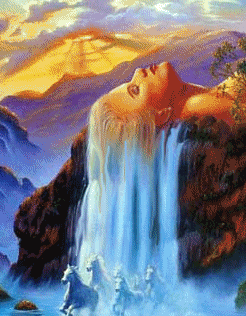

Theme Song Lyrics
"Tower of Song"
by Leonard Cohen
Well my friends are gone and my hair is grey
I ache in the places where I used to play
And I'm crazy for love but I'm not coming on
I'm just paying my rent every day
Oh in the Tower of Song
I said to Hank Williams: how lonely does it get?
Hank Williams hasn't answered yet
But I hear him coughing all night long
A hundred floors above me
In the Tower of Song
I was born like this, I had no choice
I was born with the gift of a golden voice
And twenty-seven angels from the Great Beyond
They tied me to this table right here
In the Tower of Song
So you can stick your little pins in that voodoo doll
I'm very sorry, baby, doesn't look like me at all
I'm standing by the window where the light is strong
Ah they don't let a woman kill you
Not in the Tower of Song
Now you can say that I've grown bitter but of this you may be sure
The rich have got their channels in the bedrooms of the poor
And there's a mighty judgement coming, but I may be wrong
You see, you hear these funny voices
In the Tower of Song
I see you standing on the other side
I don't know how the river got so wide
I loved you baby, way back when
And all the bridges are burning that we might have crossed
But I feel so close to everything that we lost
We'll never have to lose it again
Now I bid you farewell, I don't know when I'll be back
There moving us tomorrow to that tower down the track
But you'll be hearing from me baby, long after I'm gone
I'll be speaking to you sweetly
From a window in the Tower of Song
Yeah my friends are gone and my hair is grey
I ache in the places where I used to play
And I'm crazy for love but I'm not coming on
I'm just paying my rent every day
Oh in the Tower of Song.




.jpg)
"And twenty-seven angels
From the Great Beyond
Oh they tied me to this table
In the Tower of Song...."





Because the Gypsy Scholar is "paying his rent every day" in writing, he can also sing that "twenty-seven angels from the Great Beyond / They tied me to this table right here in the Tower of Song."


Re-Vision Radio, is where you may "hear those funny voices" (of the "Visiting Muses"), because its co-host, "The Angel of Imagination & Music," may be playing your song in order to help you "find what it is that I've been looking for / in the middle of the night"—the TOWER OF SONG


"The Angel of Music visits me at night, in dreams, and sings songs in my head."-Christine Daae, The Phantom of the Opera
The Angel of Imagination


.
.
See What I Mean
by the TOWER OF SONG's
"Musekal-Memorial Library”

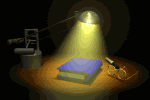
Because the (Romantic) TOWER OF SONG program is dedicated to the "Life of the Mind," it must be admitted that the Gypsy Scholar, even in an age of high-tech digital media, is still a lover of books—and even "bookish." Therefore, let it be known that this "music program" (as defined by conventional radio formats) is as much about books and reading as it is about music. Although we are told that the new electronic digital medium is geared away from reading and that books will eventually become obsolete, the fact is (a la McLuhan) that the cast off book environment
becomes a work of art in the new, larger, and invisible environment and not replaced by the electronic media. This means that, paradoxically, the new media becomes another manifestation of the archetype of "The Book."
"The Book" or "Library" has been, since time immemorial, understood as "sacred" (and the sacred library was a "temple," as in ancient Egypt, conceived of as the "Archetypal Book" kept by the archangels since the beginning of time, and even portrayed as a metaphor / symbol for the "Creation" in the Mind of God. Therefore, what this ultimately means for the cyberspace text is that in the TOWER OF SONG's "Musekal-Memorial Library” (that "more complex space") the archetypal book exists in the imagination of the reader:
"The structure of the narrative will, therefore, not be revealed in the linear narrative of this book, but in the hypertext in which all the texts are stacked in the imagination of the reader. In this more complex space, permissible and forbidden knowledge cross in ways that excite the artists but disturb the academic clergy." –William Irwin Thompson
Indeed, it seems that today’s artists/writers know full well the re-visioning of the “book” and the role of the “reader” (and even the new dimension of media that combines book and song):
“I want everybody to to be able to read my work. . . . So come into the circle and we'll tell this story together. Because, of course, what the reader does is the really radical thing; the really creative thing is done by the reader. The reader takes a book, a collection of pieces of paper on which there are little black ink-stains called words, and the reader brings the story to life. What you're doing as the writer is you're giving the reader sheet music and the reader is going to play the song. You know, so I try in write in a way that has a three-dimensionality that invites the reader to walk in--you help me make the story rather than be in the pulpit or on the stage and talk down to the audience. . . .” –Joseph O'Connor (Novelist and brother of Sinead O'Connor. Radio interview 3/10/11)
Therefore, Gypsy Scholar's program of "Argument & Song" (in the "invisible landscape" "in the middle of the night," and "by the banks of the river of dreams") is also for "Readers and Lovers of Books." Because in the TOWER OF SONG's "Memorial-Musekal Library" they can really see what I mean: how a summer night can make you a conscious being of a living book:
The reader became the book; and summer nightWas like the conscious being of the book—Wallace Stevens
"Our minds are doorways into an infinite labyrinth. A kind of Borgesian library of infinite possibilities and we can choose to open these doorways in whatever sequence or fashion we wish."
—Terence McKenna




Your Invitation to Enter the
Tower of Song Memorial-Musekal Library:
“Our minds are doorways into
an infinite labyrinth ...
a kind of Borgesian library
of infinite possibilities….”
I became a Gypsy Scholar when I sealed my fate by entering through that "magic door" that lead to the Memorial-Musekal Library in the Tower of Song, where I discovered magical, living books (and the music that went with them). Therefore, because the goal of the program is to help listeners also find and enter the "magic door" into the Tower of Song, that Master of Synchronistic Radio Ceremonies, Sir Primal Form Magnifico (a.k.a. "DJ Magnifico"), invites listeners to share this supremely fortunate fate—now that all our eyes see what I mean!
In the midnight hour, the time is right—"All our eyes have seen / ... at the door / The book is open wide / Now to seal my fate / . . .
Sir Primal Form Magnifico
To enter Imaginarium Library,
click "magic door" (le porte magique)

